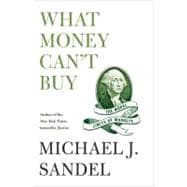
Note: Supplemental materials are not guaranteed with Rental or Used book purchases.
Purchase Benefits
What is included with this book?
The New copy of this book will include any supplemental materials advertised. Please check the title of the book to determine if it should include any access cards, study guides, lab manuals, CDs, etc.
The Used, Rental and eBook copies of this book are not guaranteed to include any supplemental materials. Typically, only the book itself is included. This is true even if the title states it includes any access cards, study guides, lab manuals, CDs, etc.
Introduction: Markets and Morals
There are some things money can’t buy, but these days, not many. Today, almost everything is up for sale. Here are a few examples:
•A prison cell upgrade: $82 per night.In Santa Ana, California, and some other cities, nonviolent offenders can pay for better accommodations—a clean, quiet jail cell, away from the cells for nonpaying prisoners.
•Access to the car pool lane while driving solo: $8 during rush hour.Minneapolis and other cities are trying to ease traffic congestionby letting solo drivers pay to drive in car pool lanes, atrates that vary according to traffic.
•The services of an Indian surrogate mother to carry a pregnancy: $6,250.Western couples seeking surrogates increasingly outsourcethe job to India, where the practice is legal and the priceis less than one- third the going rate in the United States.
•The right to immigrate to the United States: $500,000.Foreigners who invest $500,000 and create at least ten jobs in an area of high unemployment are eligible for a green card that entitles them to permanent residency.
•The right to shoot an endangered black rhino: $150,000.South Africa has begun letting ranchers sell hunters the right to kill a limited number of rhinos, to give the ranchers an incentive to raise and protect the endangered species.
•The cell phone number of your doctor: $1,500 and up per year.A growing number of “concierge” doctors offer cell phone access and same-day appointments for patients willing to pay annual fees ranging from $1,500 to $25,000.
•The right to emit a metric ton of carbon into the atmosphere: €13 (about $18). The European Union runs a carbon emissionsmarket that enables companies to buy and sell the right topollute.
•Admission of your child to a prestigious university: ?Although the price is not posted, officials from some top universities toldThe Wall Street Journalthat they accept some less than stellar students whose parents are wealthy and likely to make substantial
financial contributions.
Not everyone can afford to buy these things. But today there are lots of new ways to make money. If you need to earn some extra cash, here are some novel possibilities:
•Rent out space on your forehead (or elsewhere on your body) to display commercial advertising: $777.Air New Zealand hiredthirty people to shave their heads and wear temporary tattooswith the slogan “Need a change? Head down to New Zealand.”
•Serve as a human guinea pig in a drug safety trial for a pharmaceutical company: $7,500.The pay can be higher or lower,depending on the invasiveness of the procedure used to test thedrug’s effect, and the discomfort involved.
•Fight in Somalia or Afghanistan for a private military company: $250 per month to $1,000 per day.The pay varies accordingto qualifications, experience, and nationality.
•Stand in line overnight on Capitol Hill to hold a place for a lobbyist who wants to attend a congressional hearing: $15–$20 per hour.The lobbyists pay line-standing companies, who hirehomeless people and others to queue up.
•If you are a second grader in an underachieving Dallas school, read a book: $2.To encourage reading, the schools pay kids foreach book they read.
•If you are obese, lose fourteen pounds in four months: $378.Companies and health insurers offer financial incentives forweight loss and other kinds of healthy behavior.
•Buy the life insurance policy of an ailing or elderly person, pay the annual premiums while the person is alive, and then collect the death benefit when he or she dies: potentially, millions (depending on the policy).This form of betting on the lives ofstrangers has become a $30 billion industry. The sooner thestranger dies, the more the investor makes.
We live at a time when almost everything can be bought and sold. Over the past three decades, markets—and market values—have come to govern our lives as never before. We did not arrive at this condition through any deliberate choice. It is almost as if it came upon us.
As the cold war ended, markets and market thinking enjoyed unrivaled prestige, understandably so. No other mechanism for organizing the production and distribution of goods had proved as successful at generating affluence and prosperity. And yet, even as growing numbers of countries around the world embraced market mechanisms in the operation of their economies, something else was happening. Market values were coming to play a greater and greater role in social life. Economics was becoming an imperial domain. Today, the logic of buying and selling no longer applies to material goods alone but increasingly governs the whole of life. It is time to ask whether we want to live this way.